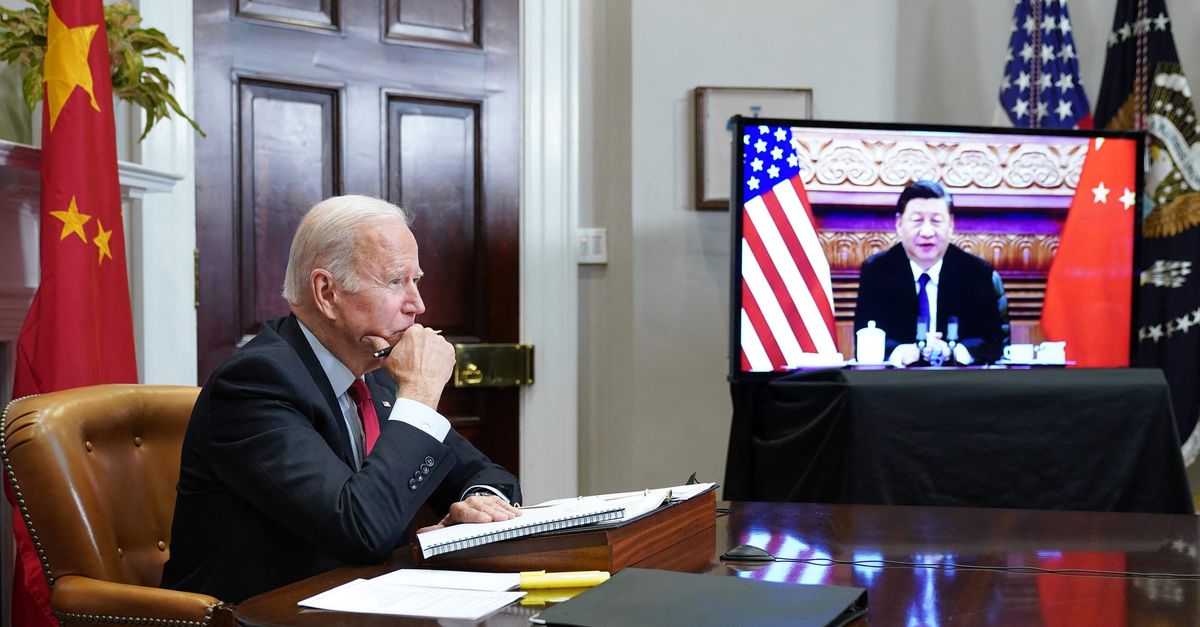Mark the “red lines”. Going the “right way”. Ahead of the summit between Chinese President Xi Jinping and US President Joe Biden, the rhetoric isn’t looking very relaxed. Monday, the ‘first world summit of the Second Cold War’ (according to Gideon Rachman In Financial Times) with the G20 in Bali, Indonesia, where world leaders are meeting in what they hope are years of healthy competition between their countries and not violent conflict.
“The United States must…”, Chinese Foreign Ministry spokesman Zhao began his response during a press conference. In other words: From China’s point of view, it is America’s turn, and it is up to the United States to “bring the relationship between China and the United States onto the right path of healthy and sustainable development.”
At a press conference earlier in the week, Biden went through possible topics for the summit: Taiwan, trade, nuclear weapons. What are the frameworks in which these topics are discussed?
Taiwan
Hot topic, especially from Nancy Pelosi’s visit, Speaker of the House of Representatives for the island. “The United States must stop hiding, distorting, and distorting the One China Policy,” Zhao said: The United States must recognize that China and Taiwan are indivisible. China sees the island nation as the last piece of China not yet connected to the motherland. It must happen sooner or later, using force if necessary. If China does so, it will be an internal matter of China and nothing to do with the US.
Biden has said that four times Taiwan will protect If China attacks, the U.S. supplies more weapons so Taiwan can curl up like a porcupine to defend itself against China, and a new Republican Speaker of the House of Representatives can return to Taiwan: this is only for China’s signs. Increasing US support for ‘separatists’ in Taiwan.
With China insisting that the US is showing more aggressive support for Taiwan, the US is trying to let some steam off the boiler. Biden said “nothing has changed” in US policy on Taiwan. He refused to repeat at a press conference that he wanted to defend Taiwan in case of armed Chinese aggression. “I will discuss this with Xi.”
Ukraine and arms control
China told visiting German Chancellor Olaf Scholz earlier this month China does not support the use of nuclear weapons on the Eurasian continent. At least that’s one thing, but China isn’t willing to do much. China does not condemn Russia’s invasion of Ukraine.
China is looking further ahead. Russia is a key ally for China in combating what China sees as unsustainable US global hegemony. In practice, China provides limited support to Russia, and does not supply large quantities of arms. It largely conforms to Western taboos.
Biden has maintained a deliberately relaxed approach to China’s stance on the Ukraine war. “I don’t believe China has much respect for Russia or Putin.” According to Biden, China is keeping Russia “at a distance.”
Read more While the US is getting tougher on China, the EU has yet to go that far
The US administration is increasingly concerned about China’s own nuclear ambitions. In Nuclear Status Review 2022, released last month, the Pentagon wrote that the Chinese will have “at least 1,000 nuclear weapons” by the end of the decade. This would allow them to intimidate and provoke, the US government fears. “The numbers and where they put those weapons will be an important topic of discussion,” Biden said.
Biden wants to address Bali in North Korea. North Korea appears to be preparing for a nuclear test, its first since 2017, and appears to be well on its way to developing an effective nuclear missile.
Jake Sullivan, Biden’s security adviser, said on Saturday that Biden would ask Xi to use his influence to “stop the worst trends in North Korea.” Because: “If North Korea continues on this path, it will mean more U.S. defense and military personnel in the region,” Sullivan said.
It is unclear what Xi can or will do. So far, China has only talked about it in very general terms: All parties must de-escalate and create the conditions for the resumption of dialogue on disarmament.
Trade restrictions
In the US it is in October New restrictions have been announced In US Semiconductors and Semiconductor Exports Made by US Machines. This is a very sensitive blow to China and Xi will want to talk about it. The move thwarts China’s ambitions to become a technological superpower as well. For China, the move is evidence that the United States has not given China its place on the world stage.
China also wants to talk about the yet-to-remove U.S. tariffs on Chinese products, restrictions on U.S. workers in the Chinese chip industry and other measures the U.S. says are against its policy of economic globalization.
In the U.S., the restrictions have been received as “the start of a new U.S. policy to actively curb large parts of China’s technology sector.” Suppress to kill”, as Gregory C. Allen wrote the Center for Strategic International Studies.
Biden kept a low profile. “Fair trade” will certainly be discussed, he said.
Human rights
China does not like to discuss ‘human rights’. At least: when it comes to the fate of Uighurs and Tibetans or Chinese lawyers and other human rights defenders. At most, Xi will point out that the US in particular is a serious violator of human rights, see for example the rights of blacks in the US.
Biden has already noticed this year how sensitive human rights are to China. This spring, he issued a joint press statement with New Zealand Prime Minister Jacinda Ardern in which both leaders expressed “serious concerns” about human rights abuses in Xinjiang and restrictions on freedom in Hong Kong. China condemned the report as defamation and interference in domestic affairs.







